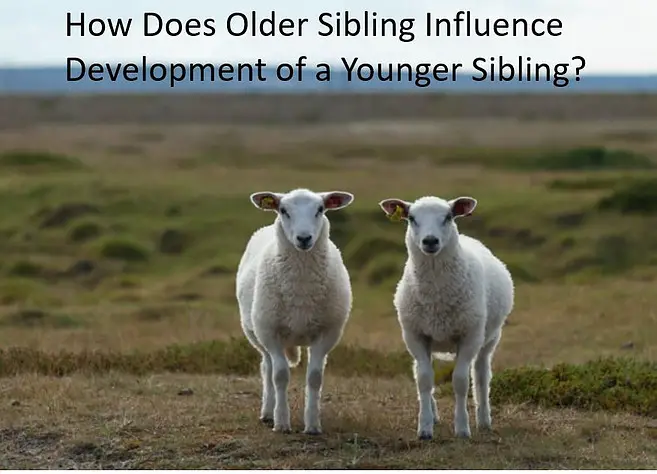How Does Older Sibling Influence Development of a Younger Sibling? (5 Things You Need To Know)

Parents play a vital role in their children’s life. As primary carers, they are responsible for their kids’ healthy upbringing. And serve as a source of support, guidance, and love for the entire family.
But we all know that…
What isn’t that obvious is that the younger sibling’s behaviour and development may be more influenced by older siblings than by parents.
And the quality and strength of sibling relationships will determine the effect of this influence. Because the tighter the bond between siblings, the stronger the impact on each other lives they have.
But don’t take my word for it.
This conclusion comes from several studies of siblings’ relationships that I will share here.
So, let’s begin, shall we?
How Does Older Sibling Influence Development of a Younger Sibling?
There are few more weighty sources of influence on young kids’ lives than their older siblings. Partially, because younger siblings will instinctively copy what the older one does and what she says. Hence, older siblings can shape the social and emotional development and conflict management skills of younger ones. In close relationships, younger siblings are equally prone to pick up positive and bad habits and traits from their older brothers or sisters. For example, they develop empathy and learn to act cool among their peers, but they can also take up smoking, use drugs and alcohol or become violent.
1. Older Siblings Shape Emotional Development of Younger Siblings
Ever thought of your first child as a leader, teacher, or ever (very occasional) caregiver to your younger one?
Well, since they say “it takes a village to raise a child”, then there is nothing wrong with your older kid bossing around your little one.
Whatever keeps both busy… (and safe, of course!)
Ok, seriously.
Whether you like it or not, your older one will naturally be involved in your little one’s development. On so many levels: social, emotional, cognitive, and even language skills.
And the stronger the bond, the more powerful impact– in both positive and negative ways, too.
In other words, it is worth ensuring your firstborn is an appropriate role model for your younger kids. Voila.
Most siblings are the first playmates and oldest friends.
After all, they spend plenty of time together playing and interacting – more than with their parents. And as a result, they get to know each other well.
Especially during creative and engaging role-playing, they learn about each other’s emotions, thoughts, and beliefs. And if the older sibling is warm, kind, and caring, the younger one will strive to behave similarly.
Simply because almost all younger siblings will enthusiastically copy older siblings. They want to look and act like them, and it will help them connect to their big brothers or sisters.
And all this is nothing other than learning and practising empathy. Empathy is a key element of emotional intelligence—the ability to understand and care about others’ feelings and see things from their perspective.
We can notice the first signs of empathy in infants between 8-10 months old. And through continuous interaction with their older siblings, within the next 6 months, they will start responding to the distress of others with simple facial expressions.
Research showed that children with higher levels of empathy become kind, respectful, and loving adults. They are also less likely to be aggressive bullies or display other adverse behaviour.
2. Older Sibling Helps in Casual Social Interactions
I mentioned that older siblings are more influential models than a child’s parents.
So, how can this status quo be questionable?
Ok, to be fair to the parents, it’s not like their older offspring completely diminished their role!
Parents still play the predominant role in passing the social etiquette and traditional values in formal situations. For example, how to behave on a plane or at the supermarket or how to interact with family at dinner.
But the youngsters will look up to their older siblings, with whom they have a tight bond, for more informal life lessons, such as how to act among peers at school or in everyday life. As a result, they are able to develop socially and emotionally, have a better understanding of the world around them, and participate in it more effectively.
After all, siblings spend most of their time socializing and sharing experiences during childhood – often without parents’ supervision.
This allows them to develop social competencies that they likely wouldn’t have if they were interacting with parents only.
Related post=======> Why Do Older Siblings Act As Parents?
3. Older Siblings Help Develop Conflict Management Skills
A large chunk of growing up with siblings means having regular fights.
*** Fun fact: did you know siblings fight 7.5 times per hour on average? That’s insanely a lot of fights!
I’ll tell you more.
A sibling dispute isn’t necessarily a bad thing!
If you think about it – when they fight with each other, they have the opportunity to develop and practice conflict management skills. A rather powerful skill in later life, I would say.
But that’s not it!
A good old row between siblings will also enhance negotiation skills, persuasion, the ability to fight for their point, and problem-solving!
And they do it in a secure environment, which siblings’ relationship truly is.
Under 8-year-olds, however, lack the skills to handle conflicts effectively on their own.
That’s where parents come to play.
So parents will have to be a mediator to moderate the conflict and help children work it out.
And by working it out, I don’t mean separating siblings or punishing them for the argument. This won’t solve the problem.
Parents should encourage them to discuss what happened, listen to both sides, and guide them toward a solution.
And this is how parental intervention in kids’ arguments should work.
4. Troubled Older Siblings Affect Younger Siblings
Several studies also show that siblings who developed intimate and loving relationships from the start will probably continue in that manner throughout their lives.
The truth is, not all sibling relationships are all hearts and rainbows.
The effects of poor sibling relationships will be nothing but negative and destructive. Because good behaviour in older siblings can be as contagious as the sociably unacceptable one.
But there is more bad news.
Here is another example to prove that older siblings have a more immense effect on the younger ones than their parents.
This research looked into parents and older siblings who smoke, and its aim was to determine who has a more profound influence on the younger sibling who takes up smoking.
And the results were consistent. The older siblings turned up to be more influential than the parents on the younger sibling’s actions – yet again.
The same goes for drinking, taking drugs, and anti-social behaviour. If the older sibling is involved with any of that, there is a high risk (like 25% likelihood) that the younger one will follow the same suit.
Unless parents get involved and don’t allow the younger kid to hang out with the older sibling and the delinquent peers who could get him in trouble.
5. Sibling Rivalry
Now, there is nothing wrong with a little healthy competition between siblings.
As a matter of fact, it can enhance school grades or athletic performance. As it may motivate the siblings to give their best.
However, sibling rivalry, jealousy, and competition often harm their relationship and the whole family dynamics.
So, what is the reason for the constant bickering between siblings?
Older kids may feel that their relationship with their parents will deteriorate with the arrival of a new baby. Therefore, they may compete for their parent’s attention or resources. Simple as that.
The initial trivial fights for toys, for example, if they continue during childhood and adolescence, may become more serious. And even last until adulthood!
Now, parents’ reactions to their kid’s rivalry will make an enormous difference in how their kids get along.
The worst the parent can do is to have a favourite child or compare children to one another!
Especially when parents praise the child, that does better.
First, parents must be there for each child! And must understand and attend to the need of each kid individually. Then all kids feel equally loved and cared for, and no one needs to compete for their parents any longer!
How Does Sibling Rivalry Affect Child Development?
Related post ========> Can Babies Manipulate Their Parents Into Doing Something?
Final Few Lines
Most people believe that parents play the most influential role in their children’s lives.
The truth is that the youngsters view their older siblings as their primary role models and strive to imitate them.
Particularly, when learning social conventions in casual situations and how to act among peers. In the eyes of the younger sibling, their big brother or sister has more authority than their parent.
As a result of unlimited play and interaction, older siblings are excellent teachers of social, emotional, and cognitive skills. And through frequent arguments, a younger child can develop conflict management skills.
Unfortunately, younger siblings are also prone to pick up bad habits and behaviours from their older siblings, such as smoking, drinking, or antisocial behaviour.
Because younger siblings will copy all kinds of behaviour – the good and the bad.
So it is worth ensuring your first child is a well-rounded little person.
But if you kinda messed up things with your older one, think of your younger child as your second chance to get the whole parenting thing right! 😉
After all, everyone deserves a second chance!
